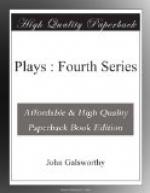Mrs. L. No, me dear. Drat this last one—me old fengers!
L. Aida. I learnt some poytry to-dy—I did.
Mrs. L. Well, I never!
L. Aida. [Reciting with unction]
“Little
lamb who myde thee?
Dost
thou know who myde thee,
Gyve
thee life and byde thee feed
By
the stream and oer the mead;
Gyve
the clothing of delight,
Softest
clothing, woolly, bright;
Gyve
thee such a tender voice,
Myking
all the vyles rejoice.
Little
lamb who myde thee?
Dost
thou know who myde thee?”
Mrs. L. ’Tes wonderful what things they tache ya nowadays.
L. Aida. When I grow up I’m goin’ to ‘ave a revolver an’ shoot the people that steals my jools.
Mrs. L. Deary-me, wherever du yu get yore notions?
L. Aida. An’ I’m goin’ to ride on as ‘orse be’ind a man; an’ I’m goin’ to ryce trynes in my motor car.
Mrs. L. [Dryly] Ah!—Yu’um
gwine to be very busy, that’s sartin.
Can you sew?
L. Aida. [With a Smile] Nao.
Mrs. L. Don’ they tache Yu that, there?
L. Aida. [Blending contempt and a lingering curiosity] Nao.
Mrs. L. ’Tes wonderful genteel.
L. Aida. I can sing, though.
Mrs. L. Let’s ’ear yu, then.
L. Aida. [Shaking her head] I can ply the pianner. I can ply a tune.
Mrs. L. Whose pianner?
L. Aida. Mrs. Brahn’s when she’s gone aht.
Mrs. L. Well, yu are gettin’ edjucation! Du they tache yu to love yore neighbours?
L. Aida. [Ineffably] Nao. [Straying to the window] Mrs. Lemmy, what’s the moon?
Mrs. L. The mune? Us used to zay ‘twas made o’ crame cheese.
L. Aida. I can see it.
Mrs. L. Ah! Don’ yu never go wishin’ for it, me dear.
L. Aida. I daon’t.
Mrs. L. Folks as wish for the mune never du no gude.
L. Aida. [Craning out, brilliant] I’m
goin’ dahn in the street.
I’ll come back for yer trahsers.
Mrs. L. Well; go yu, then, and get a breath o’ fresh air in yore chakes. I’ll sune ’a feneshed.
L. Aida. [Solemnly] I’m goin’ to be a dancer, I am.
She rushes suddenly to the door, pulls it open, and is gone.
Mrs. L. [Looking after her, and talking to herself.] Ah! ’Er’ve a-got all ’er troubles before ’er! “Little lamb, a made’ee?” [Cackling] ’Tes a funny world, tu! [She sings to herself.]
“There
is a green ’ill far away
Without
a city wall,
Where
our dear-Lord was crucified,
’U
died to save us all.”




